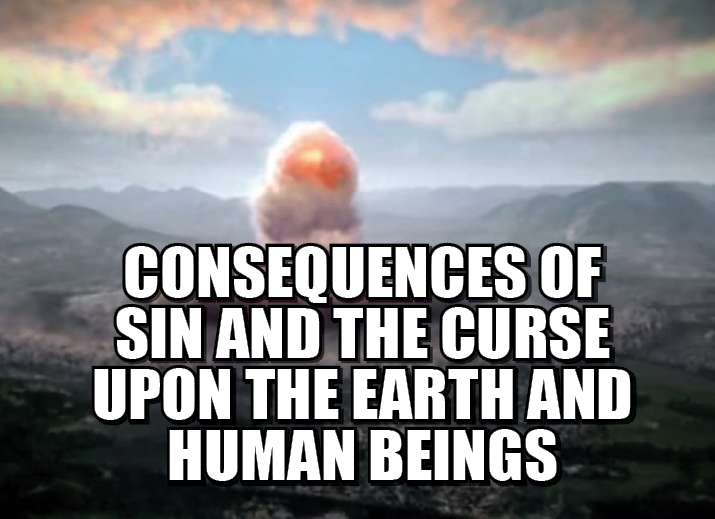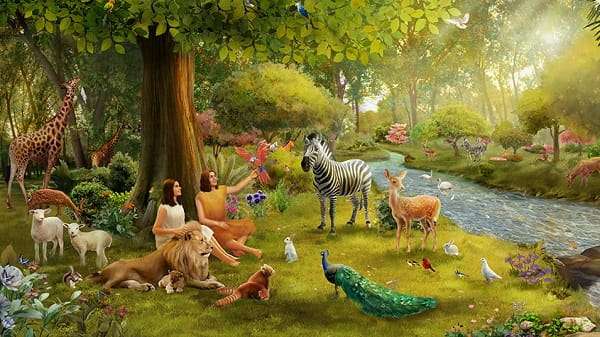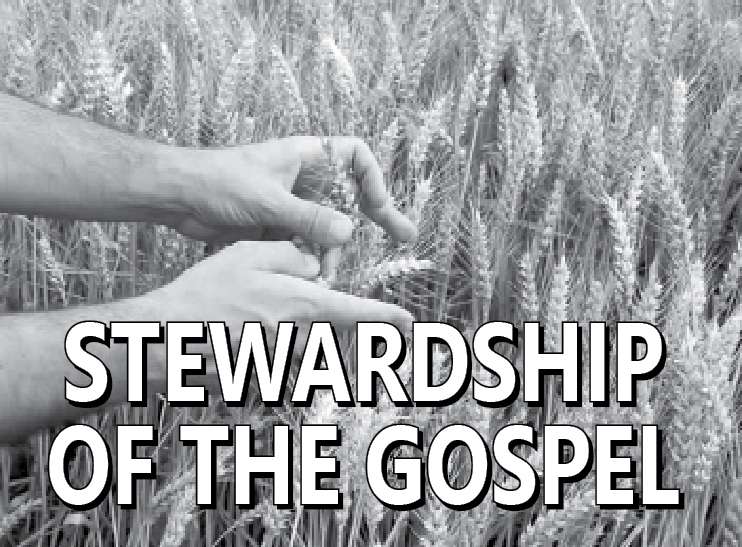
Consequences of Sin and the Curse upon the Earth and Human Beings
Pr. Thomas Cherian
Introduction
In the beginning God created the beautiful heavens and the earth. The earth was without any imperfection and everything everywhere was peaceful and blessed. Human beings were created to rule over the creation and take care of it (Gen. 1:28; 2:15). However, the status of the earth, the plants, and all living creatures including human beings was changed as a result of human sin and the resulting curse.
In the following study we shall look into the various meanings of terms such as sin and curse and also explore the various consequences of sin and the curse upon Earth and human beings.
I. The Concept of Sin
A) Definition
The theme of “sin” is found throughout the Bible. Sabourin defines sin as ‘an act of offence against God by despising His persons and Christian Biblical law, and by injuring others.’ Pfeiffer points out that there are at least eight different terms in the Hebrew Old Testament reflecting some aspect of sin, e.g., “bad,” “wickedness,” “iniquity,” etc. while there are 13 different words in the New Testament which similarly depict various shades of sin, e.g., “evil,” “unrighteousness,” “transgression,” etc. The basic violation of the commandment of God by the first parents gave birth to original sin. The result of the disobedience by the first parents was termed as “the fall of mankind” by theologians.
B) The Theology of the Original Sin
In traditional systematic theology, the term "original sin" refers to the consequences of humanity's first sin. Although theologians differ in their explanation of the original sin, everyone’s focus is on the condition into which Adam's descendants are born as a result of Adam's fall into sin. Adam's disobedience negatively impacts every human being that descends from him except for Jesus Christ.
Original sin is what a person has owned since he or she was born and cannot escape. Every person who is born must accept this because people are born from a sinful lineage. Even without thought, speech or deed, original sin is already there, implanted in us. There is no one among us who can avoid it. David refers to that in Ps. 51: 5, "Behold, I was brought forth in iniquity, and in sin did my mother conceive me."
II. The Effect of Sin
Sin has left a deadly hangover upon our earth and its inhabitants. In other words, the entire creation was subjected to the ‘bondage of depravity’ (Rom. 8:20-21). The effects of sin can be divided into two parts: the immediate and the eventual effects.
A) The Immediate Effect of Sin
It is known that as soon as the first parents broke God’s command they lost the glory that covered them and were confronted and cursed by their Creator (Gen. 3:7-19). What is meant by the word “curse”?
Curse: Definition
The word “curse” is derived from the Old English curs, which are prayers that evil or harm befalls one or it’s a delivery of a person to an evil fate. The noun cursian means to wish evil to or to condemn someone though words.
From a Biblical point of view, the word curse means that humans and animals would now suffer pain, disease, and eventually, death. Work would be difficult and painful as thorns and thistles now compete for the ground. Scripture is clear that all creation was affected by the curse and therefore suffers as mentioned above.
B) The Eventual or the Ripple Effect of Sin
When human beings sinned, they were cursed and therefore it led to the ripple effects on human beings specifically and the earth generally. The whole of creation was entrusted to humans (Gen. 1:28) who were expected to be its stewards (Gen. 2:15). This means that when the responsible persons were affected, all creation had to bear its consequences.
The phrase, “the decline, decay or the loss'' (cf. Rom. 8:20,21) explains ‘the after effects of sin.’ I would like to term it “the loss of the restorative capacity.” The following are a few areas impacted by this loss:
1) The Loss of the Restorative Capacity
After the fall of man there was a total loss of order as there were thorns and thistles that developed on earth. The restorative counterpart ceased at the fall. Before the fall, creation was free from degeneration. When the Israelites wandered in the wilderness, God provided for them in a very special way. Not only did God supply food (Ex. 16:35), but He also preserved their clothing and prevented their feet from swelling (Deut. 29:5; Neh. 9:21). Since clothing normally wears out with time, it would seem that God was acting in a restoring capacity so that there was no net decay of the material. Just as an air conditioner maintains the temperature of a room, the presence of God was preserving His people during their wilderness journey.
Therefore, as a result of the fall God removed this restorative capacity from humans and even banished them from the garden of Eden (Gen. 3:22-24).
2) The Loss of the Restorative Effect on the Spiritual Life
We should remember that the immediate effect of Adam’s sin was spiritual. It’s the spirit component that connected humans with God. Sin ruined the perfect and constant communion that humans once enjoyed with their Creator. Death, and the problems of life, are consequences of human disobedience to the Creator. “Death” is used in several senses in the Bible, yet it always implies some type of “separation.” Once humans are separated from God, life becomes horrible. The first parents were terrified when they heard the voice of God. Their spirits became inactive and dormant (cf. Eph. 4:17-19; Rom. 1:18-32). Their spiritual strength couldn’t be restored because of the sin (Isa. 59:1-2).
3) The Loss of the Restorative Effect on the Physical Life
God cursed the physical universe as a result of Adam’s disobedience. Scripture very clearly states that physical death is the result of Adam’s sin (cf. Gen. 3:17–19, Gen. 2:17, Rom. 5:12; 1 Cor. 15:21-22). We don’t know if the death of the living (nephesh) animals was destined or not, but it is clear their death was also instituted as a result of Adam’s sin, since God killed an animal (or animals) to provide skins of clothing for Adam and Eve (Gen. 3:21).
God intended humans to live forever, had they not sinned (Gen. 3:22). The day they sinned they were subjected to a process of degeneration, which eventually would culminate in physical death (Gen. 3:22-24; 5:5). The age limit for human lifespan decreased as time went by (Gen. 6:3; Ps. 90:5). When the restorative capacity was removed, humans were subject to various types of sickness. The age of man was limited (Job 14:1) and death was viewed as man’s enemy (1 Cor. 15:26).
4) The Loss of the Restorative Effect on the Mental State
The fall has reduced the sensitivity of the soul to zero. Unless one is so hardened that his conscience can no longer feel guilt- a potential possibility (cf. Jn. 12:37ff; Eph. 4:19; 1 Tim. 4:2)-the consciousness of sin will trouble the sensitive soul. It is the sorrow of guilt that leads one to repentance (2 Cor. 7:10). Many minds are troubled because of the burden of guilt. According to Dr. S. I. McMillen, “Medical science recognizes that emotions such as fear, sorrow, envy, resentment and hatred are responsible for the majority of our sicknesses. Estimates vary from 60 percent to nearly 100 percent.” Since the restorative capacity was disabled, the mental state of humans continued to be negatively impacted.
5) The Loss of Harmony Among the Animal Kingdom
Though the snake was believed to be the most beautiful of all the creatures of the earth, it suffered the most by being cursed for luring humans into committing sin. The curse naturally would be for lending its body to Satan to deceive mankind. We don’t know whether the snake was able to walk on foot or fly like birds but it was cursed by God to crawl on its stomach and consume the dust out of which it was formed. Although there is no mention of any curse on the animals as such, the state of harmonious living among them was lost after the fall. The Book of Isaiah talks about the restoration of harmony among animals one day (Isa. 65:25).
6) The Loss of the Human’s Anesthetic Ability
Anesthesia is the administration of medication to allow medical procedures to be done without pain, and in some cases, without the patient being aware during the procedure. The concept of suffering developed as a result of sin and the curse. The woman was cursed for agreeing to the deceptive words of the serpent and falling into its trap. All of womankind would endure pain as a result of the fall and the curse (Gen. 3:16). Every time a woman bears a child, she is reminded of the curse that was pronounced upon her by God. Pain became the norm and the anesthetic ability was therefore lost.
7) The Loss of the Restorative Capacity of the Earth to Regenerate
Although God had placed Adam in the garden to ‘till it’ and ‘take care of it,’ it was not a difficult task at all. He was actually overseeing it and maintaining the garden. However, life became difficult after the fall when he had to really toil to earn his living. While it had once been his friend and willing subject, the earth was now resistant, unfruitful, and hard labour was required to yield its produce. It was left to itself, and so it was no longer able to bring forth choice trees laden with generous fruit, such as Adam found in the garden. The natural tendency was now to degenerate and produce “thorns and thistles.” Only after man’s hard work will he be able to “eat the herb of the field” (Job 30:4). In short, nature lost the tendency to repel the problem of decay and degeneration. This is, however, believed that it will be restored in the new earth system (Isaiah 55:13).
8) The Loss of the Restorative Capacity in the Global System
As noted above, there was the “thorn and thistle” effect of sin that afflicted the newly created earth. As a result of the fall, the physical globe underwent a change. Noah’s flood was the result of sin that had a violent effect upon our planet. Subterranean “fountains” yielded vast and violent explosions of water from the “windows of heaven” and the bowels of the earth for 40 days and nights (Gen. 7:11). The composition of the ancient earth was radically affected. Global and continental temperature zones were altered, and varying pressure systems created an environment that facilitated hurricanes and tornados. Land mass arrangements became unsettled and earthquakes followed in their wake. As time passed, the climatic system became totally disturbed and uncontrollable. This led to the increase of natural calamities day by day. In short the whole global system was affected, because it had lost the restorative capacity to behave normally.
9) The Loss of Restorative Spirit Among Societies/Nations
The rebellious nature of man, an offshoot of sin (Gen. 11:1-4) caused God to “confound their language” and scatter them abroad (vv. 7-8). As a result of language isolationism and genetic pool developments, various “races” ultimately sprang up. The history often records the racial rivalry and hostility within the societies and nations. It is a lingering effect of humanity’s disobedience. A nation is formed out of human societies. History documents the rise and fall of nations. There is a moral standard that the Creator expects of nations (Prov. 14:34), and when wickedness prevails, He can remove kings (Dan. 2:21), and overthrow empires (Psalm 22:28; Dan. 4:17). In a post-fall world, there is no nation, empire or society that has been consistently stable. In other words because of the continuous rebellious nature found in societies and nations, the restorative spirit could not play its constructive role.
10) The Loss of Restorative Spirit led to the Ultimate Eternal Consequences
Although the fall of humanity has affected the relationship between humans and God, with the coming Christ it has paved the way for the broken relationship with God to be restored on a daily basis. This restoration is possible only if the human being accepts Christ into their heart and continues to believe in Him. However, if the human being willfully rejects the offer, he or she will be doomed to hell’s fire. In either case the ultimate result is going to be either heaven or hell depending upon their will and confession (2 Thess. 1:7-9). Sin is widespread in our lives. It corrupts every part of fallen humanity's being which include the body, soul, mind, desire and thought and everything else. And as a result, it also corrupts everything that flows from our being - everything we think, do and feel (I Jn 2:16). Therefore, the sinful nature that was inaugurated with the fall of mankind brings eternal consequences.
11) Personal and Practical Consequences
With the fall, the human race became slaves to sin. Every descendent of Adam and Eve had corrupted minds; they broke the divine law and the covenant of love for both God and neighbor. They were tainted by sin and therefore unable to please God by their own effort (Rom. 8:6-8). Everyone born in this world has a rebellious nature. Even a child of God faces this practical problem on a daily basis. Like Apostle Paul says, even if he wanted to do good, he fails to do so (Rom. 7:19). That is why there are problems between spouses, families, and even in so-called Spirit-filled churches. Children of godly parents become rebellious and backslide from their faith.
On a daily basis it is becoming more and more difficult to lead a holy life in this world. There are new temptations and challenges every day. People are interested in selfish gains and are insensitive to others’ needs. Believers are moving from Christ-centeredness to self-centeredness. Churches are splitting for trivial reasons and divorce rates are on the rise among the so-called believing community. Intense prayer support is needed for the Church leaders and Christian counselors who are trying their best to address to a number of practical issues at personal, family and church levels, irrespective of the age, gender, language or race.
CONCLUSION
In the above discussion, we have explored the meaning and origin of sin in the human race. We have also considered sin's consequences of corruption, alienation and ultimately, death. Sin is seen as a terrible burden and a cruel taskmaster that chains humans to corruption in this life, and drags us into everlasting death. It robs one of much and provides him with nothing.
Thomas DeWitt Talmage once wrote: “No man becomes evil at once; but suggestion brings on indulgences; indulgence, delight; delight, consent; consent, endeavor; endeavor, practice; practice, custom; custom, excuse; excuse, defense; defense, obstinacy; obstinacy, boasting; boasting, a seared conscience and a degenerated mind.”
Adam didn't physically die as soon as when God cursed him. And the same thing is true of the rest of us. God permits us a physical lifespan on earth. But Scripture does imply that Adam died spiritually when he was cursed, and that his natural descendants are spiritually dead before they come to faith (Rom. 5:12-17). Sin entered through one man, and it can only be overcome and eradicated by believing and abiding in the perfect and sinless Christ and His word on a daily basis. This spiritual battle can be won on a yearly, monthly, daily, hourly or even minute-by-minute basis. As children of God, if we practice seeking the sanctification through Holy Spirit, it will one day lead us to glorification.
Sin not only distorted the connection between human beings and God but it disturbed the entire earth. We know that the whole creation has been groaning as in the pains of childbirth right up to the present time” (Rom. 8:20-22).
The weight of human sin would cause us to despair if we didn't have hope in Christ. Let’s therefore pray daily to lead a victorious life with the help of the Holy Spirit, intercede for others and also eagerly wait for the day the Lord will transform the entire world and make everything new (Rev. 21:1).








